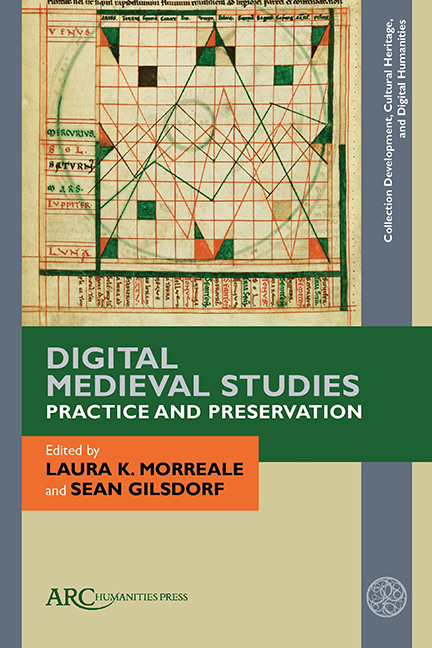Book contents
- Frontmatter
- Contents
- List of Illustrations
- Introduction: The Medievalist, Digital Edition
- Chapter 1 Beginnings: The Labyrinth Medieval Studies Website
- Chapter 2 New Approaches to Old Questions: Digital Technology, Sigillography, and digisig
- Chapter 3 Corpus Synodalium: Medieval Canon Law in a Digital Age
- Chapter 4 Teaching Constantinople as a (Pixelated) Palimpsest
- Chapter 5 Life on—and off—the Continuum
- Appendix: Permanent Links to the Catalogued Assets of Profiled Projects
- Index
Chapter 3 - Corpus Synodalium: Medieval Canon Law in a Digital Age
Published online by Cambridge University Press: 07 October 2022
- Frontmatter
- Contents
- List of Illustrations
- Introduction: The Medievalist, Digital Edition
- Chapter 1 Beginnings: The Labyrinth Medieval Studies Website
- Chapter 2 New Approaches to Old Questions: Digital Technology, Sigillography, and digisig
- Chapter 3 Corpus Synodalium: Medieval Canon Law in a Digital Age
- Chapter 4 Teaching Constantinople as a (Pixelated) Palimpsest
- Chapter 5 Life on—and off—the Continuum
- Appendix: Permanent Links to the Catalogued Assets of Profiled Projects
- Index
Summary
CORPUS SYNODALIUM BEGAN, as so many research projects do, with a question that could not be answered. I had spent the previous five years exploring the spread of ideas and practices concerning mass expulsion in the later Middle Ages, a topic that had pulled me far from my earlier stomping grounds in the economic history of the high medieval Mediterranean. Instead, I found myself wading through Parisian sermon collections, Flemish settlement privileges, English administrative records, and—most fearsomely of all—the arcana of canon law. In 1274, in an attempt to halt the spread of professional Christian moneylending north of the Alps, the Second Council of Lyon had mandated the expulsion of foreign usurers. Early in my research, it occurred to me that it might be interesting to trace the dissemination of this conciliar decree in local sources, in particular the statutes that were issued at provincial councils and diocesan synods. After all, one of the primary purposes of such gatherings—as spelled out in the Fourth Lateran Council's decree Sicut olim—was to disseminate knowledge of church law among the clergy, who might then proclaim it to the faithful. I thus was curious about the role that these local ecclesiastical statutes had played in normalizing the penalty of expulsion in Christian thought and practice.
Tracking down these statutes proved considerably more challenging than I had expected. I discovered firsthand the limitations of the early modern conciliar collections (especially Mansi's Sacrorum conciliorum); the frustrations of phantom references to long-lost manuscripts; the unpredictable hours of local diocesan archives; and (on a more positive note) the miracle-working abilities of my institution's interlibrary loan staff. By the time I finished hunting down roughly eight hundred of these statutes, it was clear that the diffusion of the Lyonese expulsion decree was patchy at best. About thirty late medieval ecclesiastical statutes mentioned it explicitly, but most episcopal lawgivers simply ignored it, while a few others reworked the decree's language and provisions so as to weaken its force. Whether because of ignorance, disinterest, discomfort, or resistance, the bishops of late medieval Europe had done little to disseminate knowledge of the decree's demands. I presented these findings to my dissertation committee, only to be asked: “Were these patterns specific to this decree? Or was such sparse local reception true of conciliar decrees in general?”
- Type
- Chapter
- Information
- Digital Medieval Studies - Practice and Preservation , pp. 49 - 76Publisher: Amsterdam University PressPrint publication year: 2022



